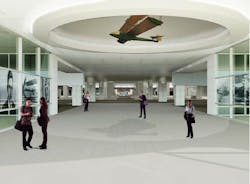The Hillsborough County Aviation Authority Board approved today a 2014 capital budget amendment to spend $928 million on projects implementing the first phase of the airport’s master plan.
“This is a significant step toward making our 20-year vision for Tampa International Airport a reality, as well as putting thousands of people to work and contributing to the Tampa Bay region’s economy,” Tampa International Airport CEO Joe Lopano said. “These initial projects will help us decongest roadways and curbsides, allow rental car companies to grow, and begin to set the stage for the doubling of passenger capacity projected over the next couple of decades.”
The first phase projects include a $417.5 million automated people mover leading from the main terminal to a $318.7 million consolidated rental car center, a $122.5 million main terminal expansion and other roadway and facility improvements at Tampa International Airport. The plans for the main terminal expansion include creating outdoor-indoor decks on the outer east and west sides of the terminal, building the consolidated rental car center entrance where the current smoking/observation deck is located and creating more open space near the shuttle lobbies and shopping areas. (Images of design renderings are attached; more are available.)
Design and construction of the first phase of the master plan is expected to create or save more than 9,000 jobs valued at $370 million over the next four years, according to analysis by airport consultant Ricondo and Associates. The first phase is also expected to boost tourism spending in the region by $620 million over the next 20 years.
The master plan, which was approved by the Board last April after more than a year of analysis and public meetings, will be funded through bonds, grant funding and public/private partnerships.

